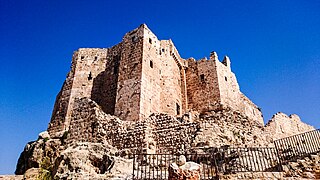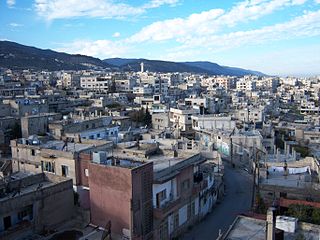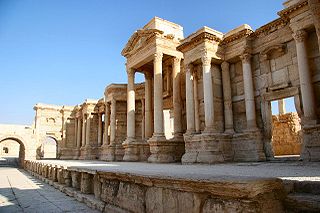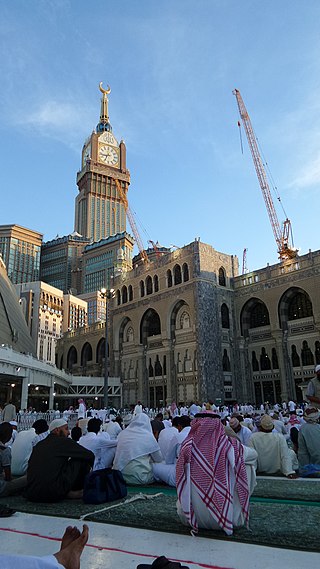Abu Qubays may refer to the following places:
- Abu Qubays (mountain), a mountain near Mecca, Saudi Arabia, believed in Islamic tradition to be the site of the splitting of the moon by Muhammad
- Abu Qubays, Syria, a fortress and village in Syria
Abu Qubays may refer to the following places:

The Order of Assassins or simply the Assassins were a Nizari Isma'ili order that existed between 1090 and 1275 AD, founded by Hasan-i Sabbah.

Masyaf is a city in northwestern Syria. It is the center of the Masyaf District in the Hama Governorate. As of 2004, Masyaf had a religiously diverse population of approximately 22,000 Ismailis, Alawites and Christians. The city is well known for its large medieval castle, particularly its role as the headquarters of the Nizari Ismailis and their elite Assassins unit.

Jabal al-Nour is a mountain near Mecca in the Hejaz region of Saudi Arabia. The mountain houses the grotto or cave of Hira, which holds tremendous significance for Muslims throughout the world, as it is here where the Islamic prophet Muhammad is said to have received his first revelation of the Quran, which consisted of the first five ayat of Surah Al-Alaq from the angel Jibra'il. It is one of the most popular tourist attractions in Makkah. The mountain itself is barely 640 m (2,100 ft) tall; nonetheless one to two hours are needed to make the strenuous hike to the cave. There are 1750 steps to the top which, even for a fit individual, can take anywhere between half an hour and one-and-a-half hours.
ʿĀmir ibn ʿAbd Allāh ibn al-Jarrāḥ, better known as Abū ʿUbayda was a Muslim commander and one of the Companions of the Prophet. He is mostly known for being one of the ten to whom Paradise was promised. He remained commander of a large section of the Rashidun Army during the time of the Rashid Caliph Umar and was on the list of Umar's appointed successors to the Caliphate, but died in the Plague of Amwas in 639 before Umar.

Hama Governorate is one of the 14 governorates of Syria. It is situated in western-central Syria, bordering Idlib and Aleppo Governorates to the north, Raqqa Governorate to the east, Homs Governorate to the south, and Tartus and Latakia Governorate to the west. It is the only Governorate that does not border a foreign country. Measures of its area vary from 8,844 km2 to 8,883 km2, with its capital being the city of Hama.

The Muslim conquest of the Levant, or Arab conquest of Syria, was a 634–638 CE invasion of Byzantine Syria by the Rashidun Caliphate. A part of the wider Arab-Byzantine Wars, the Levant was brought under Arab Muslim rule and developed into the provincial region of Bilad al-Sham. Clashes between the Arabs and Byzantines on the southern Levantine borders of the Byzantine Empire had occurred during the lifetime of Muhammad, with the Battle of Muʿtah in 629 CE. However, the actual conquest did not begin until 634, two years after Muhammad's death. It was led by the first two Rashidun caliphs who succeeded Muhammad: Abu Bakr and Umar ibn al-Khattab. During this time, Khalid ibn al-Walid was the most important leader of the Rashidun army.
Iftikhar al-Dawla was the Fatimid governor of Jerusalem during the siege of 1099. On 15 July, he surrendered Jerusalem to Raymond of Saint-Gilles in the Tower of David and was escorted out of the city with his bodyguard.
Salma may refer to:

Abu Qubays is a sacred mountain which resides on the eastern frontier of Al-Masjid Al-Haram in Mecca, in the Hejaz region of Saudi Arabia.

Al-Nusra Front, also known as Front for the Conquest of the Levant, was a Salafi jihadist organization fighting against Syrian Ba'athist government forces in the Syrian Civil War. Its aim was to overthrow president Bashar al-Assad and establish an Islamic state in Syria.
Akakir is a village in northwestern Syria, administratively part of the Hama Governorate, located southwest of Hama. Nearby localities include Kafr Ram to the west, Fahel to the south, al-Shinyah to the southeast, al-Taybah al-Gharbiyah to the east, Maryamin to the northeast and Kafr Kamrah and Awj to the north. According to the Syria Central Bureau of Statistics (CBS), Akakir had a population of 2,495 in the 2004 census. Its inhabitants are predominantly Alawites.

Abu Qubays is a former medieval castle and currently an inhabited village in northwestern Syria, administratively part of the Hama Governorate, located northwest of Hama. It is situated in the al-Ghab plain, west of the Orontes River. Nearby localities include Daliyah 21 kilometers to the west, al-Laqbah to the south, Deir Shamil to the southeast, Tell Salhab to the northeast and Nahr al-Bared further northeast. According to the Syria Central Bureau of Statistics (CBS), Abu Qubays had a population of 758 in the 2004 census. Its inhabitants are predominantly Alawites.

The Nizari state was a Nizari Isma'ili Shia state founded by Hassan-i Sabbah after he took control of the Alamut Castle in 1090 AD, which marked the beginning of an era of Ismailism known as the "Alamut period". Their people were also known as the Assassins or Hashashins.

Taha Sobhi Falaha, known by his nom de guerreAbu Muhammad al-Adnani al-Shami, was the official spokesperson and a senior leader of the Islamic State. He was described as the chief of its external operations. He was the second most senior leader of the Islamic State after its leader Abu Bakr al-Baghdadi. Media reports in August 2016 suggested he was in charge of a special unit, known as the Emni, that was established by IS in 2014 with the double objective of internal policing and executing operations outside IS territory.
Samra may refer to:

Hay'at Tahrir al-Sham, commonly referred to as Tahrir al-Sham, is a Sunni Islamist political and armed organisation involved in the Syrian Civil War. It was formed on 28 January 2017 as a merger between Jaysh al-Ahrar, Jabhat Fateh al-Sham (JFS), Ansar al-Din Front, Jaysh al-Sunna, Liwa al-Haqq, and Nour al-Din al-Zenki Movement. The unification process was held under the initiative of Abu Jaber Shaykh, an Islamist commander who had been the second Emir of Ahrar al-Sham.

Malhama Tactical is a private military contractor operating in the Syrian Civil War. The group, founded by a pseudonymous Uzbeki jihadist called Abu Rofiq, is closely allied with Jabhat Fateh al-Sham and its successor group Tahrir al-Sham. Its around dozen members occasionally participate in combat and run guns, but primarily provide training. The company has worked with Ahrar al-Sham and the Turkistan Islamic Party. According to the pro-government Al-Masdar News, its leader Abu Rofiq was killed in an airstrike on 7 February 2017, though his death has been questioned. The group stands in opposition to ISIS.

The Qalamoun offensive (2017) was a military operation launched by Hezbollah, the Syrian Armed Forces, and later the Lebanese Armed Forces, against members of Tahrir al-Sham and the Islamic State of Iraq and the Levant on the Lebanon–Syria border. The Lebanese Army denied any coordination with Hezbollah or the Syrian Arab Army.

The Tahrir al-Sham–Junud al-Sham conflict was a series of violent clashes between Hayat Tahrir al-Sham and several rival jihadist factions operating in the Idlib and Latakia governorates. The clashes began on 25 October 2021 after HTS demanded that the jihadist leader Muslim al-Shishani should stand trial after they accused him and his group of sheltering members of the Islamic State.